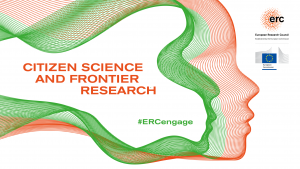
Citizen science refers to activities conducted by scientists in collaboration or consultation with the public at any stage of a research project.
It can range from citizens and local communities photographing and analysing new auroral phenomena, collecting samples of fruit flies in rural areas, to using geographical analysis and visualisation tools coupled with their local environmental knowledge, or annotating performed music structures in an online platform.
Citizen science plays an important role in encouraging public engagement with research and tackling real-world problems. Research involving citizens and allowing them to gain more insight into the scientific process can lead to more trust in science in general. Also, our environmental, health, social, economic and political challenges require scientists, citizens, policymakers, and in general, a broader range of stakeholders, to find new ways of collaborating with each other.
By sharing lessons learnt and best practices within and across scientific domains, the following challenges faced by both scientists and citizens will be addressed:
-
Participation and motivation: What are the main reasons for scientists to engage with citizens and for citizens to engage in science? How do participants benefit from their experience? What are the key obstacles for widening participation?
-
Strategies for engagement: What are the best ways to attract and sustain participation over time? How can communities of practice that encourage engagement and learning be created? What is the best way to combine physical and online tools/techniques?
-
Quality and impact: What type of knowledge can be generated and according to which standards? Is engagement with citizens a way to enhance the quality of science, or only to enhance science impact in the wider society? What is the concrete impact on scientific practices and everyday lives of citizens? What are the key enablers for citizen science?
Agenda
Morning (ERC premises in Brussels + online)
9:00 – 9:10 | Opening
President, European Research Council
9:10 – 10:00 | Setting the scene: What is citizen science and why it matters?
Moderator
Maria Leptin
President, European Research Council
Speakers
UCL (University College London)
CSIC (Spanish National Research Council)
Leiden University
10:00 – 10:20 | Coffee/tea break
10:20 – 11:30 | Sharing experiences: what methodologies, approaches, conditions work best to conduct citizen science?
Moderator
Head of the Scientific Department, ERCEA
Speakers
University of Helsinki
King's College London
University of Amsterdam
Ghent University
University of Antwerp
11:30 – 12:10 | Harvesting session: does citizen science help pushing the frontiers of knowledge? Does frontier knowledge matter for citizens?
Moderator
Aarhus School of Business and Social Sciences
12:10 – 12:15 | What’s next? by ERC
Afternoon (online only)
14:30 – 15:30 | Young people engaged for the planet
Moderator
Head of the Communication Unit, ERCEA
Speakers
Thomas Pesquet (video message)
European Space Agency astronaut
CSIC (Spanish National Research Council)
Trinity College Dublin
Vice-President, European Research Council
Students from IES Eladio Cabañero, Tomelloso (Spain) and from Mriya School, Odessa (Ukraine)
Q&A session
